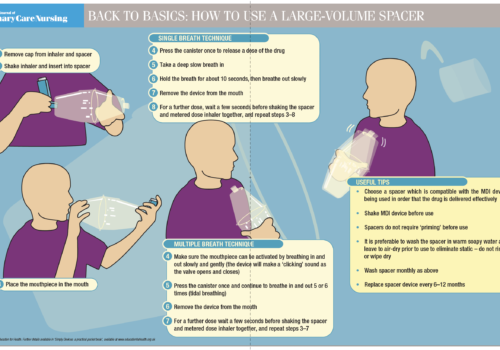You may have thought you were safe from dire warnings about global warming in the pages of BJPCN. But hayfever is one of the themes of this issue and the mild winter has meant that some people suffered symptoms much earlier than usual as pollens which can trigger allergic reactions were found in the air as early as January.
Anxiety in Patients with Respiratory Disease
Anxiety is a significant problem for many patients with respiratory disease and can have
a very negative impact on the disease course and prognosis. Practice nurses have an
important role to play in identifying anxiety and referring patients for appropriate
treatment. This article will focus on anxiety in such patients and aims to help you
understand what anxiety is, how anxiety affects patients, how to recognise symptoms of anxiety
and how to use the Hospital Anxiety and Depression Scale. A second article, to be published in
the next issue, will focus on management of anxiety.
Back to Basics: How to use a large-volume spacer
Thunderstorm Asthma
On 23 June 2005, the Met Office issued a warning that severe thunderstorms were likely
to hit the South East of England in the next 24 hours. On the evening of Friday 24 June,
primary care out-of-hours services and hospital accident and emergency departments
in Northwest London were inundated by patients attending with acute asthma. The
scale of these attendances – eight times more patients than usual in one hospital – meant that
departments had to call in additional staff and some ran out of emergency supplies of
bronchodilators, nebulisers and oral steroids for treating asthma. In this article, we will explain
the background and some of the theories related to this type of epidemic of acute asthma –
Thunderstorm Asthma.
Scoring top marks for smoking cessation
This year, as 1 July and ‘no smoking in public places’ approaches in England, many more
patients will want help to stop smoking. Practices in Scotland and Wales are already
facing this challenge. How do we optimise the smoking cessation advice we offer at the
same time as juggling the many other responsibilities we have? In this article, we look at
how to score top marks for Quality and Outcomes Framework (QOF) indicators on smoking
cessation – recording information and offering advice that will help patients to quit as well as
gaining extra payments for our practices.
Making Sense of Drug Allergy: What Goes Wrong and Why
Allergic or other immunological mechanisms are thought to account for 6-20% of
all adverse drug reactions, but in most cases the mechanism is unclear. This
article provides an in-depth review of drug allergy – adverse drug reactions with
a known immunological mechanism or with clinical features that mimic an
immunological reaction.
Editorial: Spring
Was it me? Did I blink and miss the spring? There I was, trying to plan my
early initiation of inhaled steroids and nasal sprays to ward off seasonal
exacerbations of allergic rhinitis and asthma but spring just doesn’t seem
to have sprung this year! It made me wonder whether the wet weather
had an influence on hay fever levels.
Anticholinergics: How do they Work?
Anticholinergic drugs are bronchodilators that act by blocking acetylcholine, the
neurotransmitter for the parasympathetic nervous system. By blocking parasympathetic
stimulation, anticholinergics reduce cholinergic tone, therefore producing
bronchodilation. In this article we review when and how these drugs should be used.
What are their potential benefits and what should we tell patients who need them?
Editorial
Chronic kidney disease (CKD) has moved rapidly up the healthcare agenda over the last few years. It has shifted from being considered as a rather nebulous condition of interest mainly to nephrologists to the front line of chronic disease detection and prevention in primary care as part of integrated management of vascular risk. In fact, the links between cardiovascular disease, kidney disease and diabetes are so close that CKD could also stand for ‘cardiovascular, kidney, diabetes.’
Editorial
Feel the fear and do it anyway.’ That could be the message of this special issue of the British Journal of Primary Care Nursing focusing on chronic kidney disease (CKD). Kidneys can be really confusing for practice nurses, with lots of technical sounding tests and numbers. But the good news is that the step-by-step guides and clear articles in this issue will help you get to grips with this important condition and feel empowered to make a real difference to the health and wellbeing of your patients.
Monitoring Chronic Kidney Disease Practice
The NICE guideline for chronic kidney disease (CKD) was introduced in 2008, with the aim of assisting practitioners both in primary and secondary care in the early identification and management of patients with evidence of kidney disease. However, some debate still exists surrounding the implementation of this guideline in everyday clinical practice. In this article, we sort out
Making Sense of Chronic Kidney Disease (CKD)
What exactly is chronic kidney disease (CKD), what causes it and how is it diagnosed? In this article we get down to the basics of defining what CKD is, and explore the stages of CKD. We review CKD progression and the assessment and management recommendations for each stage of CKD.























